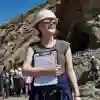



Explore the complex natural and human processes affecting the planet. And take part in eye-opening field trips to places like Almeria, Tenerife and Iceland.
Studying BSc Geography at Hull means learning about the big challenges facing the world today. Climate change, sustainability and geohazards. You’ll work with academics who are experts in these fields, and who will engage you with the latest research.
Our course is also accredited by the Royal Geographical Society. So you’ll have the peace of mind to know your degree has been approved by the relevant professional body.
About this course
We specialise in teaching climate change - both past changes and current anthropogenic global warming. Our physical geography focus includes hazards, conservation, and rivers, while in human geography we explore sustainability, development, cities, and globalisation.
In year one, you study both physical and human geography. You also learn geographical skills like GIS. In year two and three, you can choose to specialise in physical geography or continue with some human geography as well. And you have a choice of modules to pick from. So you can tailor your degree by picking the aspects of physical geography and human geography that most interest you.
Field work is a key part of our degrees. This is where what you learn in the classroom comes to life. We take you on day trips around the local area, as well as residential trips in the UK and abroad. Recent locations include Almeria, Tenerife and Iceland. You also get the option of an extra year studying abroad.
We also offer modules designed to help you develop professional skills. You can choose to do a consultancy project with an external company. Or go into schools to learn about teaching. Or develop your geospatial and modelling skills with GIS.
Start a field trip that never ends
Module options
Each year, you’ll study modules worth a certain number of credits, and you need 120 credits per year. Most modules are 20 credits – so you’ll study six modules each year. Some longer modules, such as a dissertation, are worth more. In these cases, you’ll study fewer modules - but the number of credits will always add up to 120. Some modules are compulsory, some are optional, so you can build a course that’s right for you.
Filters
Human Geography: Worlds of Connection and Difference
This module will introduce you to key perspectives in contemporary human geography. It uses the themes of difference and connection to explore a wide range of case studies.
compulsory
20 credits
Planet Earth
Develop an understanding of the Earth as a planet – the atmosphere and oceans working together to create global patterns of climate and ocean circulation; plate tectonics and the movement of continents; living systems evolving over time and forming the global biosphere; and the surface processes of accumulation and erosion shaping the landscapes around us. The module will help you to see how ideas in physical geography can be used to understand patterns observed in the natural environment at a global and continental scale.
compulsory
20 credits
Exploring Worlds Around Us
You’ll find out about many different ways of studying the world around us by exploring a specific field trip location.
compulsory
20 credits
Interpreting Environments
This module introduces you to some key tools we use to interpret the environments around us, such as computer mapping and data analysis.
compulsory
20 credits
Development and Change
Our changing world faces many challenges, especially in developing countries. Learn how geographers approach development, inequality, sustainability and governance.
compulsory
20 credits
Environmental Problems and Solutions
Discover the fundamental principles of environmental systems and the interconnectedness of humankind with the environment.
compulsory
20 credits
Frontiers in Physical Geography
This module gives you the tools needed to be a physical geographer and make an original contribution to our knowledge of the world.
core
20 credits
Geographical Information Systems
Develop your understanding of the principles and processes behind GIS, the nature and use of spatial data and the application of GIS on this practical module.
compulsory
20 credits
Cities and Globalisation
Using real examples of cities from around the world, you'll examine urban development patterns and processes in an era of rapid globalisation.
optional
20 credits
Our facilities

Watchlist
Dr Jonathan Dean
Course overview
1 min
Iceland field trip
Course Highlight
3 mins
Tenerife field trip
Course Highlight
2 mins
Teaching Facilities
University life
2 mins
Your course in their words
Student Story
2 mins
Featured academics
Teaching on our geography degrees is research-led, skills-based and geared towards employability.
Our recognised experts introduce you to the cutting-edge of emerging geographical arguments. And they give you the freedom to follow your own research interests for your final-year dissertation.

Dr David Milan
Reader in River Science
David is involved with applied research into geomorphologically-based Natural Flood Management. This includes assessing impacts of climate change on fluvial systems, and monitoring the impacts of large dams on fluvial processes and fish habitat.

Dr Jonathan Dean
Lecturer in Environmental Change Science, Director of Education, Co-Deputy Head of School
Jonathan is a Lecturer in Quaternary Science, specialising in environmental change. His research uses lake sediments to reconstruct past changes in hydroclimate in eastern Africa and the eastern Mediterranean over the late Quaternary.
Entry Requirements
What do I need?
This course is currently available through Clearing, which means our entry requirements are a bit different to what they would normally be.
At Hull, you're a name not a number. During Clearing, we look at all of your qualifications and experience, not just your academic grades. We may be able to offer you a place whatever your situation. Get started by completing our eligibility checker, and find out immediately if you could study at the University of Hull.
Have questions? Our admissions team will be happy to help.
Fees & Funding
How much is it?

Future prospects
You’ll graduate with subject-specific knowledge and skills in areas like climate change and GIS, as well as a wide range of transferable skills, such as working in a team and data analysis. So you’ll be highly employable, both in the environment sector and in the wider employment market.
Graduates work as environmental consultants, conservation officers, hydrographers, flood risk modellers, and GIS technicians. Others go into town planning or teaching. Some even enter the worlds of marketing, banking and accountancy. You’ll find them in places like Siemens, Burberry, Lincolnshire County Council, the Met Office, American Express, the British Army, the Yorkshire Wildlife Trust, and KPMG.
Become part of the next generation of futuremakers
Like what you've seen? Then it's time to apply.
The standard way is to apply through UCAS. This will give you the chance to showcase your skills qualities and passion for the subject, as well as providing us with your academic qualifications.
Not ready to apply yet?
Visit our next Open Day, and see all that the University of Hull has to offer. Talk to our lecturers about your subject, find out what university is really like from our current students, and take a tour of our beautiful campus and amazing facilities.
You may also be interested in...
All core field trips are included in the cost of your tuition. Extra fees may be payable for optional trips. Destinations listed above are currently included in our list of field trip opportunities, but may be subject to change.
94% employability (Geography and Environment) UK domicile full-time first degree leavers; Higher Education Graduate Outcomes statistics, for the academic year 2022/23, published by the Higher Education Statistics Agency June 2025.
All modules on this course page are subject to availability and this list may change at any time.